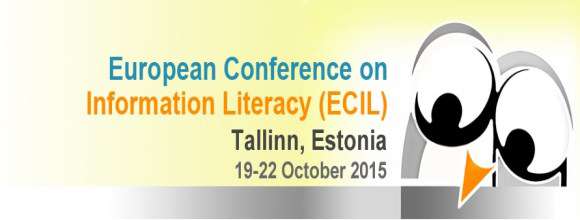European Conference on Information Literacy (ECIL 2015),19-22 October 2015,Estonia
 ECIL is an annual conference initiated by the Department of Information Management of Hacettepe University and the Department of Information and Communication Sciences of Zagreb University. It is organized and hosted by a different European partner each year. ECIL 2015 conference will be organized by the Institute of Information Studies of Tallinn University and held from 19-22 October 2015, at Tallinn University, Tallinn, Estonia.
ECIL is an annual conference initiated by the Department of Information Management of Hacettepe University and the Department of Information and Communication Sciences of Zagreb University. It is organized and hosted by a different European partner each year. ECIL 2015 conference will be organized by the Institute of Information Studies of Tallinn University and held from 19-22 October 2015, at Tallinn University, Tallinn, Estonia.
It is planned to be a Green Conference as Tallinn University has joined the Green Academic Footprint initiative of the Network of Universities from the Capitals of Europe (UNICA) in order to participate in the process of making the principles of sustainable development part of everyday life. This strategic association brings us into close cooperation with opinion leaders, policy designers, communities, companies and other universities as we share green practices aimed at diminishing our ecological footprint.
Web Site: http://ecil2015.ilconf.org/
Aim & Scope
Information Literacy, Media Literacy, Smart Lifestyle and Environmental Sustainability being the main theme, ECIL aims to bring together researchers, information professionals, media specialists, educators, enviromentalists, sustainability experts, policy makers, employers and all other related parties from around the world to exchange knowledge and experience and discuss recent developments and current challenges in both theory and practice.
In the Conference, additional to all aspects of Information Literacy the contribution of information literacy to the smart lifestyle and green society issues will be focused and explored. All participants of the conference have an opportunity to participate and set an example in this process of smart and sustainable development for society.
Main topics of the Conference include (but not limited with) the following:
- Contribution of information literacy to:
- smart lifestyle (healthy lifestyle, employability, educational innovation, open organization and governance of society)
- green practices (healthy lifestyle , education and training, library and information services)
- sustainability of the society (environmental sustainability, open organization and governance of society)
- Information literacy & lifelong learning
- Information literacy in theoretical context (models, standards, indicators)
- Information literacy & related concepts (transversal competencies, media literacy, data literacy, civic literacy, transliteracy, metaliteracy, e-literacy, digital literacy, computer literacy, scientific literacy, visual literacy, digital empowerment)
- Media and Information Literacy (MIL) as a new concept
- Information literacy research (research strategies, methodology and methods)
- Information seeking and information behavior
- Information literacy good practices
- Information literacy networks and networking
- Information literacy policies & policy development
- Information literacy & libraries (college and university libraries, school libraries, public libraries, special libraries)
- Information literacy & LIS education
- Information literacy & knowledge management
- Information literacy across disciplines
- Information literacy in different cultures and countries
- Information literacy in different contexts (law, health, etc.)
- Information literacy & education
- Information literacy education in different sectors (K-12, higher education, vocational education)
- Planning strategies for information literacy training (promotion and marketing, training the trainers, partnership, collaboration across professions, teacher education, integrating into curricula)
- Information literacy instruction (curriculum development, instructional design, teaching techniques and methods, Web-based training, e-learning, measurement and evaluation)
- Information literacy in the workplace
- Information literacy for adults
- Information literacy for children and young people
- Information literacy for disadvantaged groups
- Information literacy for multicultural societies
- Information literacy & ethical and social issues
- Information literacy & democracy
- Information literacy & citizenship
- Information literacy & digital divide
- Information literacy & emerging technologies (Web 2.0, Web 3.0, open educational resources and practices, mobile technologies)
- Information literacy in the future
Yorum gönder